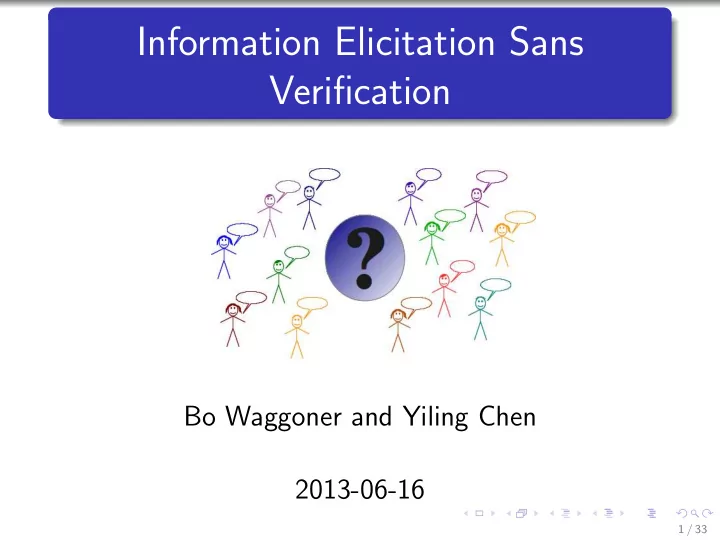

How to get around this result? Goal: overcome limitations of prior mechanisms. Obstacle: Impossibility result! 17 / 33
How to get around this result? Goal: overcome limitations of prior mechanisms. Obstacle: Impossibility result! Proposed solution : Output agreement mechanisms. simple to explain and implement 17 / 33
How to get around this result? Goal: overcome limitations of prior mechanisms. Obstacle: Impossibility result! Proposed solution : Output agreement mechanisms. simple to explain and implement applicable in variety of complex domains 17 / 33
How to get around this result? Goal: overcome limitations of prior mechanisms. Obstacle: Impossibility result! Proposed solution : Output agreement mechanisms. simple to explain and implement applicable in variety of complex domains detail-free 17 / 33
How to get around this result? Goal: overcome limitations of prior mechanisms. Obstacle: Impossibility result! Proposed solution : Output agreement mechanisms. simple to explain and implement applicable in variety of complex domains detail-free unrestricted domain 17 / 33
How to get around this result? Goal: overcome limitations of prior mechanisms. Obstacle: Impossibility result! Proposed solution : Output agreement mechanisms. simple to explain and implement applicable in variety of complex domains detail-free unrestricted domain ... but not truthful! 17 / 33
Outline Information elicitation without verification Formal setting and prior work Impossibility results for IEWV Output agreement mechanisms 18 / 33
Output agreement Truthful → common-knowledge truthful : 19 / 33
Common Knowledge Ω : possible states of the world 20 / 33
Common Knowledge Ω : possible states of the world P [ ω ] : common prior 20 / 33
Common Knowledge Π 1 : player 1 ’s partition 20 / 33
Common Knowledge Π 1 ω ∗ : true state selected by nature 20 / 33
Common Knowledge Π 1 Π 1 ( ω ∗ ) : player 1 ’s signal Pr [ ω | Π 1 ( ω ∗ )] : player 1 ’s posterior 20 / 33
Common Knowledge Π 1 Π 2 20 / 33
Common Knowledge Π : common- Π 1 Π 2 knowledge partition 20 / 33
Output agreement Truthful → common-knowledge truthful : s i (Π i ( ω ∗ )) = T (Π( ω ∗ )) . Previously: = T (Π i ( ω ∗ )) . 21 / 33
Output agreement: Origins Output agreement: informally coined by von Ahn, Dabbish 2004. 22 / 33
Output agreement: Origins Output agreement: informally coined by von Ahn, Dabbish 2004. Game-theoretic analysis of ESP Game: Jain, Parkes 2008. (Specific agent model, not general output agreement framework.) 22 / 33
Output agreement: Origins Output agreement: informally coined by von Ahn, Dabbish 2004. Game-theoretic analysis of ESP Game: Jain, Parkes 2008. (Specific agent model, not general output agreement framework.) Here: first general formalization of output agreement. 22 / 33
Output agreement An output agreement mechanism : 23 / 33
Output agreement An output agreement mechanism : a 1 a 2 report space : A 23 / 33
Output agreement An output agreement mechanism : d ( a 1 , a 2 ) a 1 a 2 report space : ( A, d ) 23 / 33
Output agreement An output agreement mechanism : d ( a 1 , a 2 ) a 1 a 2 report space : ( A, d ) h ( d ) h ( d ) payoff : h strictly decreasing 23 / 33
Output agreement Theorem For any query T , there is an output agreement mechanism M eliciting a strict common-knowledge-truthful equilibrium. 24 / 33
Proof by picture Π 1 Π 2 Π 25 / 33
Are “good” equilibria played? What is “focal” in output agreement? 26 / 33
Are “good” equilibria played? What is “focal” in output agreement? One approach: player inference , beginning with truthful strategy. 26 / 33
Are “good” equilibria played? What is “focal” in output agreement? One approach: player inference , beginning with truthful strategy. 26 / 33
Are “good” equilibria played? What is “focal” in output agreement? One approach: player inference , beginning with truthful strategy. 26 / 33
Are “good” equilibria played? What is “focal” in output agreement? One approach: player inference , beginning with truthful strategy. 26 / 33
Output agreement Inference : iteratively compute strategy that maximizes expected utility. 27 / 33
Output agreement Inference : iteratively compute strategy that maximizes expected utility. When does inference, starting with truthfulness, converge to common-knowledge truthfulness? 27 / 33
Output agreement Inference : iteratively compute strategy that maximizes expected utility. When does inference, starting with truthfulness, converge to common-knowledge truthfulness? Eliciting the mean: Yes! 27 / 33
Output agreement Inference : iteratively compute strategy that maximizes expected utility. When does inference, starting with truthfulness, converge to common-knowledge truthfulness? Eliciting the mean: Yes! Eliciting the median, mode: No! 27 / 33
Output agreement Inference : iteratively compute strategy that maximizes expected utility. When does inference, starting with truthfulness, converge to common-knowledge truthfulness? Eliciting the mean: Yes! Eliciting the median, mode: No! (arbitrarily bad examples) 27 / 33
Output agreement Mechanisms on many players? 28 / 33
Output agreement Mechanisms on many players? (Yes) 28 / 33
Outline Information elicitation without verification Setting Impossibility results Output agreement 29 / 33
Summary 30 / 33
Summary IEWV: formalized mechanism design setting. 30 / 33
Summary IEWV: formalized mechanism design setting. (Almost) all mechanisms have bad equilibria. 30 / 33
Summary IEWV: formalized mechanism design setting. (Almost) all mechanisms have bad equilibria. There are no detail-free, unrestricted-domain, truthful mechanisms. 30 / 33
Summary IEWV: formalized mechanism design setting. (Almost) all mechanisms have bad equilibria. There are no detail-free, unrestricted-domain, truthful mechanisms. Output agreement: 30 / 33
Recommend
More recommend